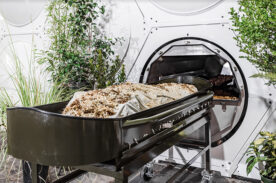
WASHINGTON — A U.S. bishops’ committee said they oppose recent alternatives for human burial and traditional cremation, contending they “fail to satisfy the Church’s requirements for proper respect for the bodies of the dead.”
The March 23 statement by the bishops’ Doctrine Committee specifically addressed human composting and alkaline hydrolysis — a cremation process that uses chemicals, water, heat, and pressure.
The committee said, “Every human being has been created in the image of God and has an inherent dignity and worth,” and respect for the person also should include “respect for the body.”
It also stressed that the Church considers burial to be “the most appropriate way of manifesting reverence for the body of the deceased,” as it “clearly expresses our faith and hope in the resurrection of the body.”
The bishops’ committee said the Catholic Church permits cremation, but that burial is the preferred method.
In looking at the alkaline hydrolysis process of cremation, the committee noted that the 100 gallons of liquid where the body was dissolved in is then “treated as wastewater and poured down the drain into the sewer system” or in some cases it is treated as fertilizer.
“This procedure does not show adequate respect for the human body, nor express hope in the resurrection,” the bishops said.
They noted that after a traditional cremation process, human remains reduced to powder can be placed in an urn and interred in a sacred place.
They said the human composting process was similarly disconcerting because when it is done, “there is nothing left but compost, nothing that one can point to and identify as remains of the body” and instead just “a cubic yard of compost that one is invited to spread on a lawn or in a garden or in some wilderness location.”
In human composting, the body is wrapped in a shroud and placed on a bed of organic material and then is placed in a sealed vessel where decomposition takes place. The body becomes soil, suitable for fertilizer, in about 4-6 weeks.
Both methods leave nothing distinguishable of the body “to be placed in a casket or an urn and laid to rest in a sacred place where Christian faithful can visit for prayer and remembrance,” the bishops said.
“The way that we treat the bodies of our beloved dead must always bear witness to our faith in and our hope for what God has promised us,” they added.
In New York, at the end of last year, Gov. Kathy Hochul signed a bill legalizing Natural Organic Reduction — also called human composting — making the state the sixth in the country to legalize this method along with California, Colorado, Oregon, Vermont, and Washington.
The New York State Catholic Conference, the public policy arm of the state’s bishops, had argued against the legislation, saying it “ignores the dignity due the deceased.”
“Human bodies are not household waste; they are vessels of the soul,” said Dennis Poust, executive director of the New York State Catholic Conference, in a Jan. 2 statement.
Similar legislation for human composting is currently being considered in Illinois and Maryland, and both state’s Catholic conferences are speaking out against it.
The Maryland Catholic Conference sent an action alert in late March urging Catholics to contact their legislators and urge them not to support the human composting bill, which it said would “allow deceased persons to be turned into compost, a disposable commodity that will then be dumped onto the ground, including potentially public areas, and with no notification to people that they are walking on human remains.
“As Catholics, we call for deceased persons, as temples of the Holy Spirit, to be buried intact or as cremains in a cemetery,” the alert said.
The Illinois Catholic Conference is also opposing similar legislation being considered by state legislators.
“Intentionally using human remains as fertilizer through human composting should not be a legal means of final disposition,” it said on its website.
The state Catholic conference said traditional forms of burial “keep the remains together and encourage family members and religious communities to pray for and remember the dead. The burial of the dead is one of the corporal works of mercy and, for many Christians, a sign of faith and hope in the resurrection.
It also pointed out that the state has laws concerning the disposition of human bodies because society understands that the human body should be treated with respect and dignity and added that the state’s bishops oppose “any tendency to minimize the event of human death and the meaning it has for humanity.”
